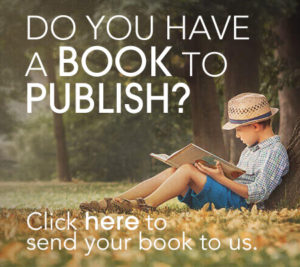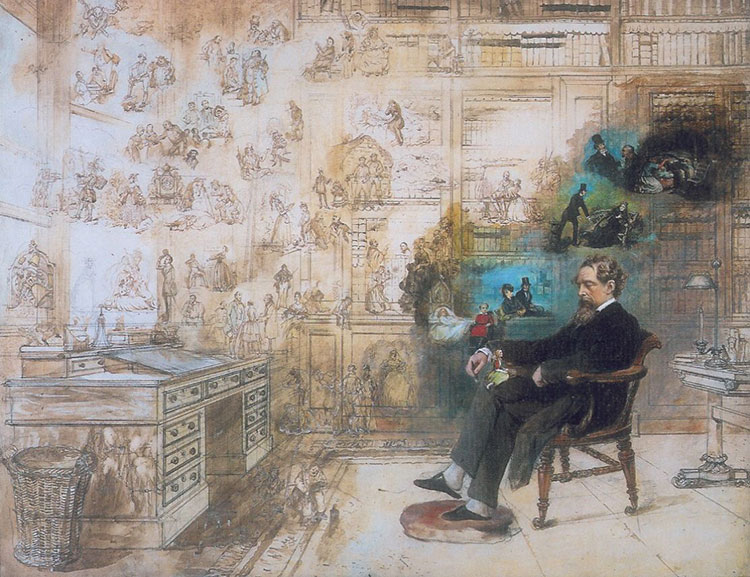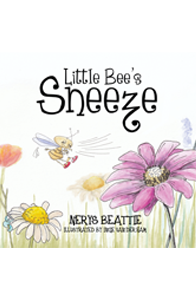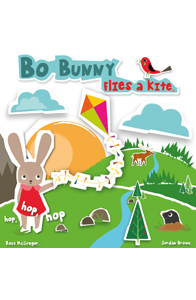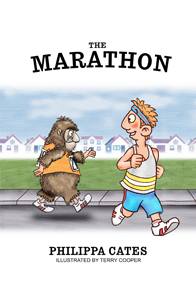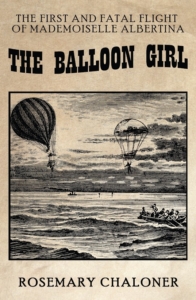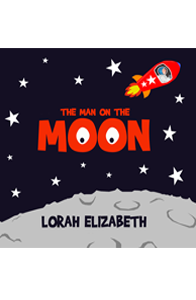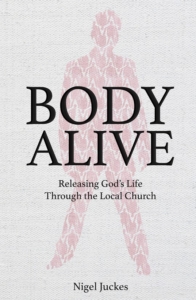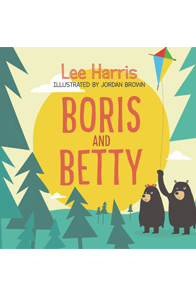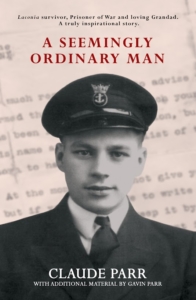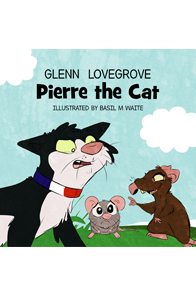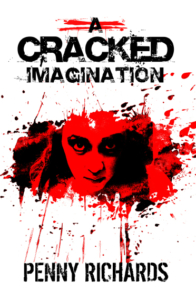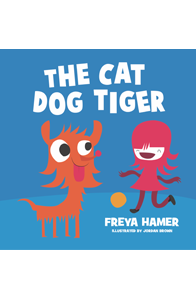As of 2019 bees are currently at a higher risk of extinction than ever before. Pesticides appear to be the main culprit for this growing issue and with her new book Little Bee’s Sneeze Nerys Beattie hopes to send an important message to children and adults alike.
Nerys has taken time away from her three-year-old son, husband and small pack of dogs, to write and create her first ever short children’s fiction book. It follows the journey of a small bee with terrifyingly allergies to flowers. This means she cannot take part in day-to-day bee life, subsequently isolating her from the rest of the hive.
Having always wanted to write, but never having had the time before, Nerys was finally emboldened to start her labour of love after deciding to prioritise the idea she had been holding onto for as long as she can remember. She says: “Once I had thirty minutes to myself and I sat down at my desk, all of the ideas came spilling out. I started at 1pm and by 8pm I had written the entire book!”
Her first venture into children’s fiction is a real treat, shining light upon the trials and tribulations children may face, up against the backdrop of a walking, talking bee hive. Having always suffered from hay fever herself, Nerys wanted to incorporate this into her story. She also tackles issues such as bullying, running away from home and feeling excluded.
Nerys continues: “I wanted to include issues that were integral for parents to talk about with their children, but can often be tricky to handle. This book will hopefully help start the conversation. I also wanted to include bee poison as a representation of the pesticides that are killing bee communities, however, it needed to remain subtle and flow well within the storyline.”
Her collaborator on this project has been Inge Van Der Ham. Inge is a fellow colleague from over twenty years ago who reconnected with Nerys after the author posted her elation at finishing Little Bee’s Sneeze. Inge reached out and offered her skills as the illustrator for the book, and the pair then began to work alongside to bring the story to life.
Little Bee’s Sneeze is an adorable short rhyming story that shows children how our differences make us special. Nerys Beattie invites us to follow the story of a small bee who, by realising her potential, can achieve miraculous things. It is the perfect read for your children during this run up to Christmas.
If you like to publish a picture book with us and take control visit: www.jellybeanselfpublishing.co.uk
Archive for Self Publish Your Own Book – Page 2
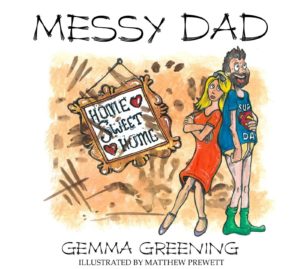
Gemma Greening never had plans to become a published author. It wasn’t until a string of funny poems she had scribbled over birthday cards to her husband; mainly for the amusement of her two sons, Alfie and Oliver, snowballed into an idea for a children’s fiction book, and all of a sudden ‘Messy Dad’ was born.
Having always had a way with words; often writing short poems here and there when she found the time, Gemma struck gold when she started constructing and stringing together some silly and satirical rhymes all based on her frustration with her partner Ben’s lack of initiative when it came to housework.
Gemma says: “It all started as a joke to be honest, the kids and I would construct these poems to write on birthday and Christmas cards for their dad. My eldest, Olli, really likes getting involved. After showing the ideas of ‘messy dad’ to some close friends, I gained the confidence, but I needed to decide to share it with an audience.”
Messy Dad is a cheeky and brassy short rhyming story, with silly anecdotes. Illustrator Matt Prewett successfully heaps on the comedy matching each verse to an equally wacky cartoon, tying the book together as dessert for your eyes. The story follows our leading man Messy Dad who happens to have some rather questionable hygiene habits and struggles to hold down the fort whilst his wife is at work.
Do you suck at spelling?
Need to improve your writing skills?
Here is your No.1 Hack – READ!
As a now published author, I was nearly kicked out of teaching college because my spelling was so poor. To fix it, I read books and the words stuck!
So, what to read is the question. Honestly, read what you love. It could be…
- Horror: Frankenstein by Mary Shelley is my favourite. A story of love and family.
- Fantasy: The Hobbit by JRR Tolkien… crazy ideas, he is a master.
- Comedy: The Twits, or any book, by Roald Dahl… insane fun.
- Picture books: Alexander and the Terrible, Horrible, No Good, Very Bad Day… how is your day really?
- Information: Everyone Poops… honest and hilarious.
- Poetry: Green Eggs and Ham by Dr Seuss. Dr Seuss is another master of writing.
- Enchanted: Harry Potter and the Philosophers Stone JK Rowling: my kids just loved it!
- Life: The Rainbow Fish by Marcus Pfister. How can one give more?
- Feelings: The Red Balloon by A Lamorisse.
- Wild Adventure: Revenge of the Cannibal Chickens by Gavin Lihou. Dead set greatest book of all time!
Let us look randomly at No. 3. Roald Dahl and The Twits! Roald Dahl really does bend the mind of his readers. His use of alliteration and similes is second to none. Ahhhh… but what is alliteration? Here you go my friends, this is writing hack number 2!
Alliteration is the repetition of the same letter or sound of words. Like… She sells sea shells by the sea shore (a great tongue twister). Or… Three grey geese (Mother Goose).
But Dahl is very smart… he writes:
‘squiggly spaghetti’ (s and as).
‘Bogus and Bunce and Bean, one fat one short one lean.’ (carries the ‘b’ for Bogus and Bunce and Bean and even the Bean for lean) from Fantastic Mr Fox.
Roald Dahl also uses similes, but what are similes? This is writing hack number 3!
A simile compares one thing to another:
‘Mr Twits beard was like a hairy jungle.’
‘He was among the saucepans and machines like a child amongst Christmas presents.’ – Charlie and the Chocolate Factory.
In order to write well, these are two literary devices* that we should use.
* literary devices: writing talk for stuff we should use in our writing. Make a list of them and add them to your writing and it will improve. Trust me, I am the Cannibal Chicken after all!
So… young paduans (Star Wars reference) I am your Jedi of writing. Follow me and become great writers and change your writing for the best! One book at a time. The Cannibal Chicken will help you to make your writing better, but practice you must have, my young paduans. So your list is…
- Read.
- Add alliteration to your writing.
- Add similes to your writing. The more personal the better.
And remember to…
WRITE,
IMAGINE,
And most importantly…
DREAM!
From
The Cannibal Chicken
Wait for my next writing hack and stay tuned…
If you would like to see for yourself what all of this ‘Cannibal Chickens’ nonsense is about please follow this link! And, if you too would like to become an author please get in touch with submissions@jellybeanselfpublishing.co.uk or give us a call on 02921157202!
How to Self Publish with Jelly Bean
Know Your Product
Your book is a product – and you are hoping to find buyers for it, just like any other product. But to make sure it is the best it can be – you need to know exactly what it is; are you sci-fi? Non-fiction? What is your book about? Is it a quirky encyclopaedia of the world’s weirdest garden sheds? Or a poetry collection focusing on the struggles of motherhood? Think about the objectives of your book. Knowing your product enables you to make it the best it can be in all aspects; marketing strategy, promotion, finding niche markets, editing, cover design etc.
Where
Before publishing – think about how and where you are going to sell your book. Do you want to approach retailers and bookshops or is your book just something small you want to keep for yourself? Either or, this will dictate the kind of services you require from Jelly Bean Self Publishing. For example, if you want to try and get your books into stores and libraries you will need as ISBN. These kind of thing will all shape what kind of book and deal you want to arrange with us. As a result, we recommend putting some forethought into how you’re going to sell.
Who
Think about who will read your book. If it’s a children’s book – the answer is obvious. The steps to capturing your readers might involve going to school’s to do readings or organising a reading event for children and parents in the area. Jelly Bean Self Publishing author Molly Arbuthnott reached out to schools in the UK and ended up getting orders of her book Oscar the Ferry Cat through her reaching out! So hitting the right market is really important and can really help improve your book’s success in terms of moving copies. See here for more information about Molly’s story…
How
How will you sell? Marketing. Marketing is how you will sell. People need to know your book is out there, and they aren’t going to find you – you need to find them. Here at Jelly Bean Self Publishing we do offer small marketing support, but a lot of it lies on the author’s shoulders to self promote if you want your book to do the best it can.
Attending literary events (or events to do with what your book is about) and doing readings, getting on to social media, interacting with readers and writers who follow you online, entering yourself into competitions – all of these are ways to self promote that cost little-to-nothing. If your book has a niche – make yourself known in these circles. If your book is niche – this can be both an advantage or disadvantage. You might have lots of people in the waiting for a book like yours or your niche might not exist out there – so be aware of either or and do some research if you can.
We recommend thinking of marketing as a little business; overseeing the practicalities of what will bring sales in is so important in ensuring your book’s success.
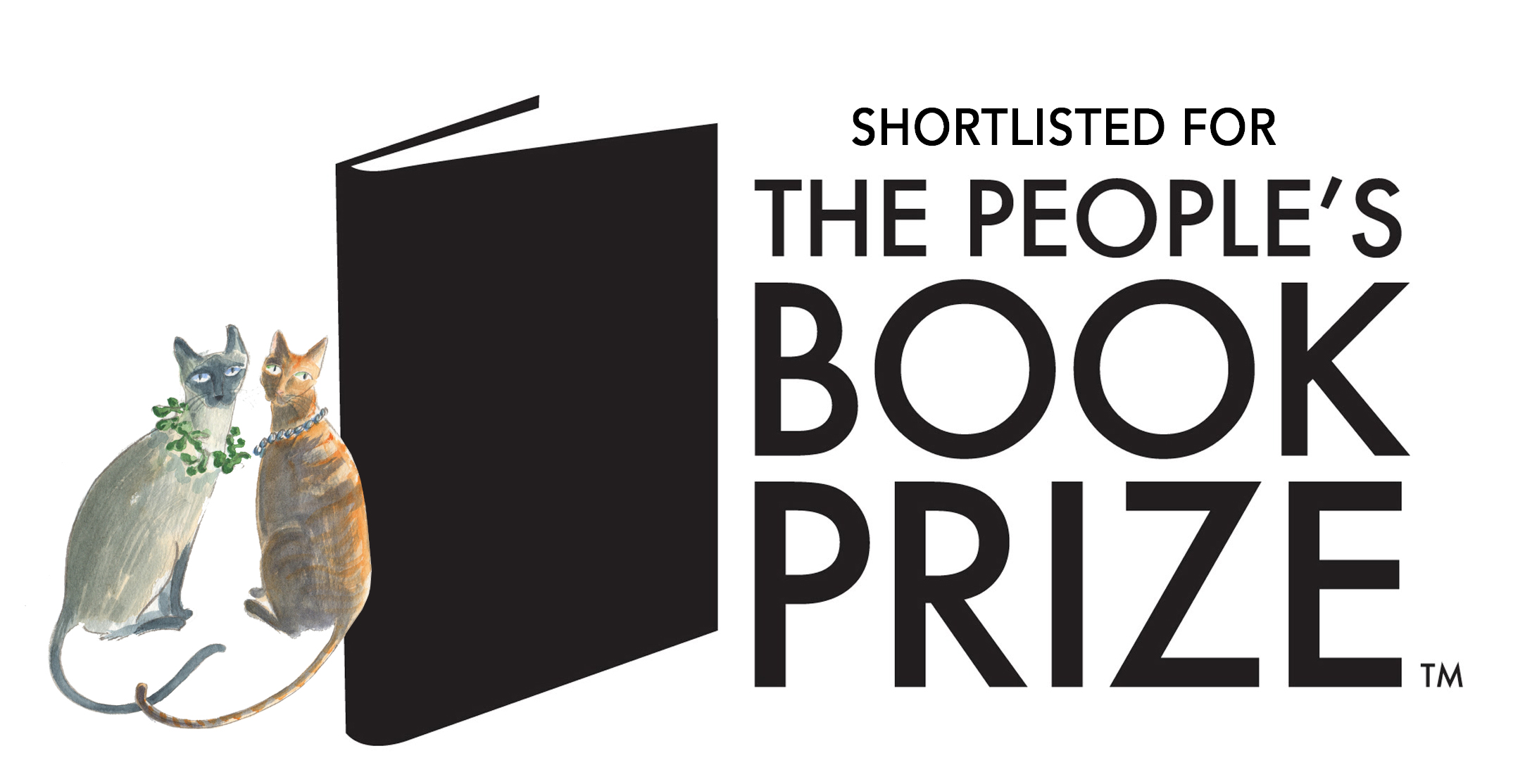 Jelly Bean Self Publishing’s London-based author Molly Arbuthnott has been nominated as a finalist for the 2018 People’s Book Prize for her heart-warming children’s book Oscar the Ferry Cat.
Jelly Bean Self Publishing’s London-based author Molly Arbuthnott has been nominated as a finalist for the 2018 People’s Book Prize for her heart-warming children’s book Oscar the Ferry Cat.
Inspired by Molly Arbuthnott’s own family cat going missing back in 2014, who, curiously, managed to open the family car’s window by stepping on the controls before the lock took full effect. The family returned to their car in Oban to find paw prints on the bonnet, but no cat.
The story immortalises the author’s beloved cat, who was sadly never found. The pages follow his experiences as he navigates coming to terms with loss and forging new friendships with different creatures and learning to cope with the new environments he unexpectedly finds himself in.
Molly Arbuthnott is one of Jelly Bean’s biggest successes, with Molly selling books to school’s around the country, children falling in love with Oscar’s loveable character and relatable story.
Beautifully illustrated by Agnes Treherne, a Sussex based illustrator who studied Fine Art at the University of Edinburgh, this book appeals to children aged 5 – 8 years as it explores Oscar searching for his new home.
A primary school teacher from London, on discovering her position as a finalist, Molly stated: ‘They say if you find a job you love you will not do a day’s work in your life. Every day for the last 6 months has felt like a holiday! It has been very humbling to witness the warm reception Oscar has received. I hope he will continue to touch the hearts of children – he’s against stiff competition but where there’s a will (and a cat!) there’s a way!’
Molly has always loved writing and is thrilled to have been nominated as a finalist for Oscar the Ferry Cat. The People’s Book Prize is the only national literature award decided upon entirely by the general public – therefore carries the additional credibility of being selected by the book’s own readers. Being a country wide competition, Oscar the Ferry Cat faced off stiff competition with hundreds of book being nominated by their publishers.
The People’s Book Prize winner will be announced in May 2019 at the Stationers Hall in London, with patron of the foundation Frederick Forsyth CBE presenting the awards.
From all of us here at Jelly Bean Self Publishing – we wish Molly (and Oscar) the best of luck and are so lucky to be able to bring Oscar’s story to children everywhere.
You can visit Oscar the Ferry Cat at his very own website: www.oscartheferrycat.

Do you have a book that you want to publish?
Why not send your book to Jelly Bean Self-Publishing?
A great way to get your book off your computer and into the world, and with 10% off this Black Friday why wait?
Just send your manuscript to submissions@jellybeanselfpublishing.co.uk with the words ‘strawberry pencil’ as the subject to receive 10% off and we will be in touch.
Valid from 14th November to 28th November 2018.
Since the London Marathon started in 1981, thousands of competitors have taken part. Going for a run is as much about your mind forcing your body out the door as it is about physical fitness. Overcoming these psychological barriers can make a difference between finishing the event or not.
 Here at Jelly Bean Self-Publishing, we want to start a reading revolution. Here are just a few reasons to put down your phone, turn off the TV, and for a few hours an evening enjoy an actual book…
Here at Jelly Bean Self-Publishing, we want to start a reading revolution. Here are just a few reasons to put down your phone, turn off the TV, and for a few hours an evening enjoy an actual book…
In the modern world, where much of our interaction with words takes place on screens (mobile phones, tablets, computers, etc.), it is certainly worth reiterating the health and lifestyle benefits of reading a good book.
Not that reading off a screen is so bad – after all, it’s led you here! But it is estimated we spend up to a whopping ten hours (!) staring at screens every day.
- Reading brings to life neural pathways in the brain. This in turn leads to the creation of new memories, and as such creates new synapses that strengthen our brains. So basically, reading is like taking your brain to the gym!
- Reading can reduce anxiety and alleviate stress. Amidst the hustle and bustle of our everyday lives, reading offers us the magic of escapism. It frees our minds, which in turn lightens the pressures of day-to-day life.
- Reading asks you to consider abstract concepts, developing critical thinking skills.
- Has a friend ever bolstered you to participate in an activity you were apprehensive about? It has been proven that readers who admire a fictional character’s courage to partake in physical challenges that scare them (g. riding a horse, climbing a mountain, sailing a boat, etc.), are themselves better able to muster the bravery to try new activities in their own life.
- It goes without saying that reading improves your vocabulary and communicative ability. If anyone’s going to impress their peers with a quick-witted remark, it’s an avid reader.
- Reading gives us a sense of self-accomplishment, boosting self-esteem.
- If you’re the sort of person to fall for fictional characters (aren’t we all?), then studies show you are a more empathetic person for it. In imagining life from another’s perspective, you yourself become a more caring, understanding person (go you!).
- Reading a book in bed helps you sleep better. Conversely, the glare of a TV screen or a smart-phone makes it more difficult to drop off.
Do you know of any positive impacts of reading we’ve missed? If so, please feel free to get in touch. Thanks for reading, and keep up the good work!
Kurt Vonnegut was an American writer and author of fourteen books, including classics such as Slaughterhouse-Five, Cat’s Cradle and Breakfast of Champions. His writing is an amalgamation of styles and genres. In his short story collection Bagombo Snuff Box, Vonnegut described eight rules for writing.

Now lend me your ears. Here is Creative Writing 101:
- Use the time of a total stranger in such a way that he or she will not feel the time was wasted.
- Give the reader at least one character he or she can root for.
- Every character should want something, even if it is only a glass of water.
- Every sentence must do one of two things—reveal character or advance the action.
- Start as close to the end as possible.
- Be a sadist. No matter how sweet and innocent your leading characters, make awful things happen to them—in order that the reader may see what they are made of.
- Write to please just one person. If you open a window and make love to the world, so to speak, your story will get pneumonia.
- Give your readers as much information as possible as soon as possible. To heck with suspense. Readers should have such complete understanding of what is going on, where and why, that they could finish the story themselves, should cockroaches eat the last few pages.
But the great man also had one very important caveat:
The greatest American short story writer of my generation was Flannery O’Connor (1925-1964). She broke practically every one of my rules but the first. Great writers tend to do that.’
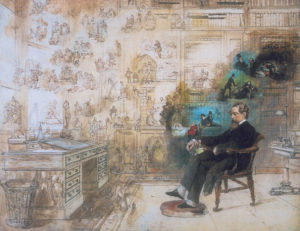
It’s Christmas! That magical time of year when we get to indulge in the finer things: quality time with our loved ones, outrageous quantities of food and drink, and those old family favourites – The Great Escape, It’s a Wonderful Life, Home Alone and so on – that keep on giving year after year.
Every family has their own Christmas classic, but if there’s one story that above all others captures the spirit of the season , it’s Charles Dickens’ A Christmas Carol. The story of the thawing of the irascible Scrooge’s cold heart, the book has proven so popular that it has been adapted for the screen no less than forty-seven times. Yet another adaptation has hit cinema screens this year, in The Man Who Invented Christmas. The story has entered pop culture like few others. How many Scrooges do you know, ready to pronounce “Bah humbug” at the first sighting of decorations? And at how many dinner tables this Christmas will some wit toast, ‘God bless, us every one!”?
Given its place as a staple of popular culture, it might surprise reader to learn that A Christmas Carol had rather troubled beginnings. Upon receiving the finished manuscript, Dickens’ publisher was lukewarm to the author’s new story; dismayed at this reaction, Dickens decided to take matters into his own hands and pay for the printing of the book himself. The rest, as they say, is history.
So, in the spirit of A Christmas Carol, what’s the moral here? It’s that publishers aren’t always right. In fairness to Dickens’ publisher, unlike Scrooge, they didn’t have a clairvoyant ghost to help see into the future. But while the publisher might be excused for not seeing the Muppet’s 1992 adaptation coming, the calculations as to the work’s commercial viability were clearly somewhat off. So if publishers are hardly infallible, why is self-publishing still so often seen as something shameful, the last resort of the failed writer? It’s hard to factor Charles Dickens into that definition. Or Beatrix Potter, whose Peter Rabbit stories were likewise self-published. Or Stephen King, Edgar Allen Poe, Margaret Atwood or Virginia Woolf, all of whom subsidised the production of their own work. Or, in the modern day, Andy Weir, whose 2011 self-published novel The Martian was adapted into an Academy Award winning 2015 movie by none other than Ridley Scott.
Perhaps if the origins of A Christmas Carol were more widely known, there would be less-stigma attached to self-publishing. Or perhaps, as the contemporary successes mount up, this attitude is already beginning to shift. With more authors electing to self-publish than ever before, it seems that writers are increasingly savvy to shortcomings of a traditional publishing arrangement.
Though many involved in the industry wish it weren’t so, publishing is a business. And like with all businesses, the bottom line is, well, the bottom line. Sometimes a book has to be turned down, regardless of its quality, simply because the money isn’t there to support its release. Sometimes a book will be turned down because it seems of niche appeal. No editor thought a work of BDSM erotica would prove quite as popular as 50 Shades of Grey has, but like it or loathe it, EL James’ self-published novel is now Britain’s best-selling book of all time.
As Dickens’ Christmas classic proves, a good idea will win out. The right story, the right subject will find a readership, as long as its author is committed and enthusiastic in sharing their work with the world. Of course, certain factors can help ease a book’s journey to commercial success: an appealing cover, an engaging blurb, a professional standard of typesetting, perfect grammar, etc. But at the heart of it all is the author and the book itself.
And luckily, there are many publishers now wising up to this. A modern self-publisher’s role is not to be a gatekeeper, turning away those deemed unworthy, but to help a book finds its place in world. Using their industry experience, a self-publisher will find a way to present a piece of writing in just the right fashion, and to just the right people, to help it along its way to success. They work with an author; they don’t dictate to them.
So this Christmas, as you take stock of the important things in life, here’s something to mull over: by Christmas 2018 your book could be wrapped up underneath thousands of trees; around the dinner table you could be toasting to your new career as an author. Sound good? Then treat yourself this Christmas and get in touch!
Our Books
Compared to other publishers that I approached, Jelly Bean always listened, gave advice and were interested in the book itself. Self-publishing can be daunting but Jelly Bean guide you all the way.
★★★★★
Ingrid Stow
All of our reviews can be found on our Google Business Page

Industry Expertise
Our team of publishing pros bring insider knowledge to every project.

Personal Service
We work one-on-one with our authors, and we’re only ever an email or a phone call away.

Quality Craftmanship
No cheap templates or generic AI. All of our interiors, covers and illustrations are bespoke.

Edited For Humans, By Humans
An editor is more than just a spellchecker. Technology is only used to complement, never to replace the human eye.

Expert Printing, Economy Prices
We’re partnered with a range of printers, and our long-standing relationships ensure you the best prices.

100% Your Book
We don’t retain any rights, extract any royalties, or withhold any files. Our contracts are clear and catch-free.





